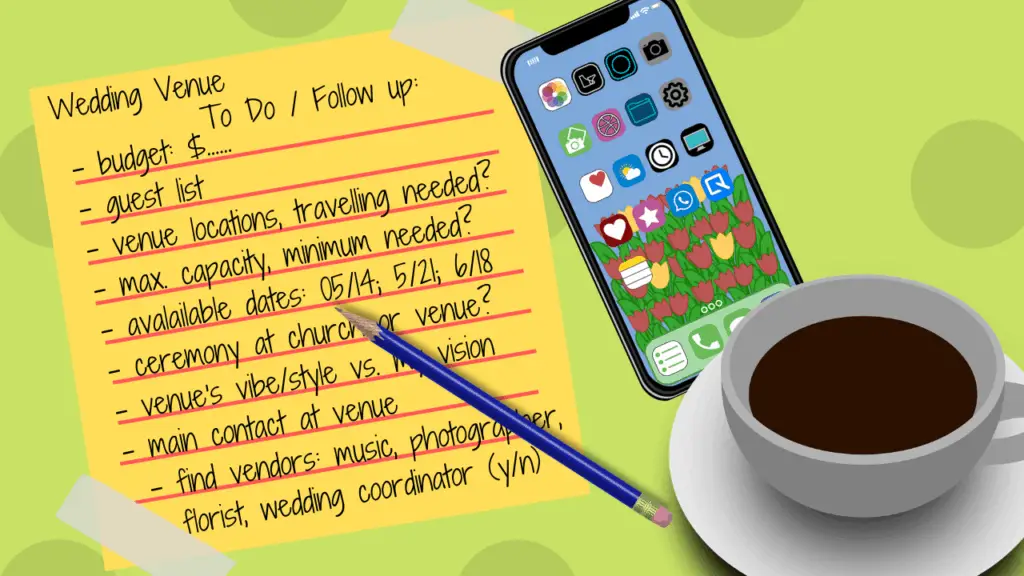Wedding Ceremony Checklist: 8 Must-Have Details for a Perfect Day
The wedding ceremony is one of the most meaningful aspects of your big day. Your marriage officially begins at this moment!
This comprehensive wedding ceremony checklist will help ensure that your ceremony kicks off without a hitch.
1. Choose the Perfect Venue for Your Ceremony
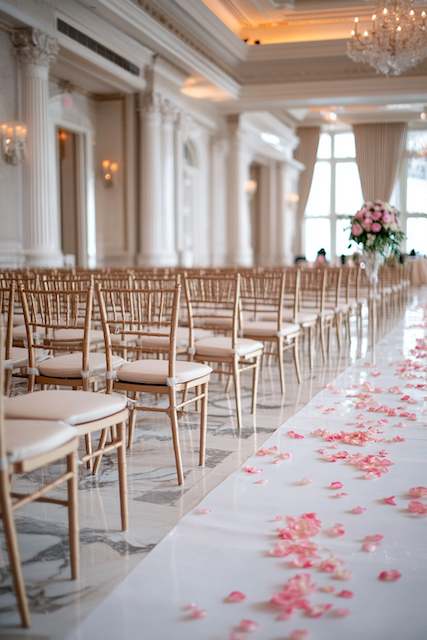
The venue for your ceremony is the first thing your guests get to see when they arrive. It should be a place that is special to you and your fiance. A beautiful venue will make your wedding day even more perfect.
What Type of Venue Feels Right for You?
Think about the vibe you’re going for, then explore venues that bring it to life. Here are some ideas to get you started:
✨ A house of worship – Traditional and timeless
✨ A hotel ballroom – Elegant and convenient
✨ A botanical garden – Romantic and lush
✨ A museum – Unique and sophisticated
✨ A historical landmark – Grand and full of character
✨ A private backyard – Cozy and personal
✨ A beach – Relaxed and scenic
Know the Rules Before You Fall in Love with the Space
Every venue comes with its own set of dos and don’ts, especially religious sites and historic spaces. Before you book, ask about:
🎀 Decor restrictions – Can you bring in your dream floral arch, or are there limits?
🎶 Music guidelines – Some places may only allow traditional music during ceremonies. (Save your playlist for the reception!)
📸 Photography policies – Know where your photographer can shoot so they don’t miss a moment.
Pro Tip: Many churches and temples also have rules about who can officiate, so clarify that early on.
If you’re considering a hotel or non-traditional space, you’ll likely have more flexibility—but it’s still smart to ask about vendor policies, timing, and any restrictions.
Practical Things to Keep in Mind
Beyond the aesthetics, your venue needs to work logistically. Run through this quick checklist:
✅ Guest count – Is there enough space for everyone to feel comfortable?
✅ Parking – Will guests find it easy to park?
✅ Accessibility – Is the venue welcoming for elderly guests or those with disabilities?
✅ Restrooms – Are they nearby and easy to find?
✅ Weather backup – If it’s outdoors, is there a solid Plan B?
2. Decide on the Type and Style of Your Ceremony
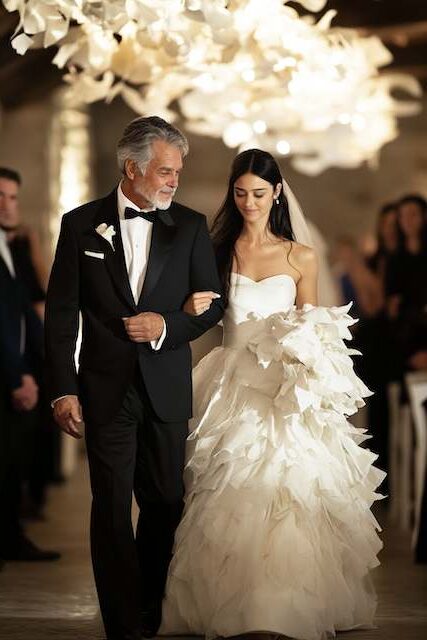
This is where your wedding day starts to take shape. The type of ceremony you choose sets the tone for everything that follows—whether it’s steeped in tradition, deeply spiritual, or completely personalized.
Ask yourself:
💍 Do you envision walking down the aisle in a centuries-old religious tradition?
💍 Or would you love a custom ceremony that tells your unique love story?
Whether it’s an intimate spiritual moment or a grand secular celebration, the style you choose will create the foundation for your day.
👉 No matter what style you choose, keeping your ceremony within budget is key. Here’s a helpful guide on wedding ceremony budgeting.
Make It Personal: Work with Your Officiant
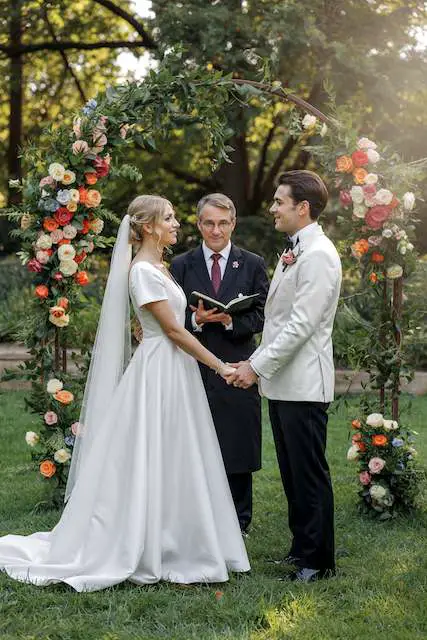
Once you’ve settled on a type of ceremony, collaborate with your officiant to make it feel like you. Some ideas to consider:
✨ Traditional vows that reflect your faith or family heritage
✨ Custom promises you write together
✨ Cultural rituals like handfasting, jumping the broom, or breaking the glass
✨ Special readings from favorite books, poems, or religious texts
✨ Unity ceremonies, such as lighting a unity candle or blending sand
The goal? A ceremony that feels genuine and meaningful to both of you.
Define the Look and Feel
Next, think about the vibe you want for your ceremony. Ask yourselves:
- Formal or informal?
- A black-tie affair or festive, casual outfits?
- Religious or secular?
- Traditional religious, spiritual-but-not-religious, or totally non-traditional?
- Serious or lighthearted?
- Solemn and reverent, or playful and joyful?
Respect Traditions (If They Matter to You)
If you’re having a religious ceremony, consider:
🙏 What religion do you practice?
🙏 What customs or guidelines come with it?
For example:
- Jewish weddings often include the Seven Blessings and breaking the glass
- Catholic ceremonies may feature Communion
- Many couples choose to write their own vows, no matter the setting
- You might want to include a unity candle or other symbolic gestures
Once You’ve Chosen the Type, Start Dreaming Up the Details!
After deciding on the ceremony style, you’re ready to plan the meaningful moments. From music choices to readings to who stands beside you at the altar, this is where the vision comes alive.
Quick Recap
✔️ Choose a ceremony style that feels true to you
✔️ Work with your officiant to personalize the experience
✔️ Honor any traditions or create your own
✔️ Set the tone—formal, casual, traditional, modern, or a mix!
3. Plan the Ceremony Flow and Key Logistics
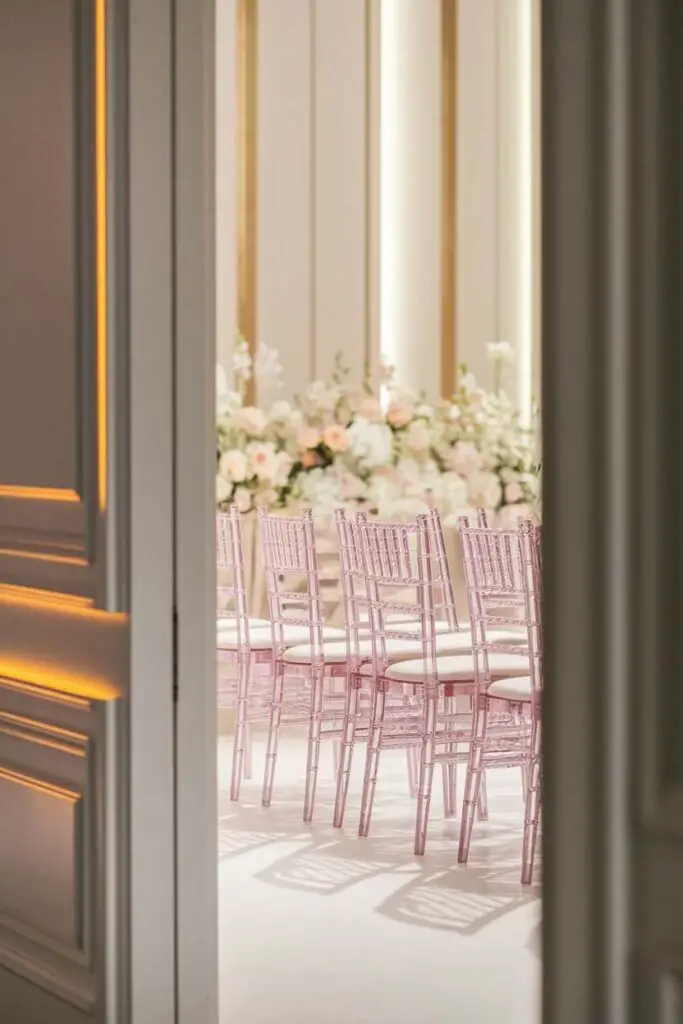
Your ceremony is the heartbeat of your wedding day—the moment everyone’s been waiting for. It deserves just as much love and attention as your reception! From your wedding party’s grand entrance to the music that makes everyone tear up, every detail matters in creating a moment you’ll cherish forever.
So, where to begin? Let’s break it down!
Start with the Ceremony Layout
How you set up the space will shape the entire experience—for you, your guests, and your photographer.
Picture this:
✨ A classic layout with rows of chairs and a petal-strewn aisle as you make your timeless entrance
✨ A ceremony-in-the-round, where you’re literally surrounded by love, hand-in-hand with your closest family and friends
✨ A scenic backdrop, like a beach or garden, where nature becomes part of the moment
Whatever speaks to your heart, your layout decision impacts:
- How your guests view the ceremony
- Where your photographer and videographer position themselves
- The flow of your wedding party’s entrances and exits
Pro Tip: Schedule a rehearsal! Even the smoothest ceremonies benefit from a quick run-through so everyone knows their cues and timing.
Map Out the Flow of Events
Once you’ve envisioned the setup, it’s time to fine-tune the order of events. Think about:
- Who will officiate? (Have they confirmed the ceremony script?)
- Who’s walking down the aisle, and in what order?
- How will you make your grand entrance? (And who will cue the music?)
- What kind of processional and recessional music do you want?
- A special song for the bridal party?
- A distinct piece for your entrance?
- Who’s responsible for cueing the musicians or DJ?
- Where will each member of the wedding party stand once they arrive at the front?
- Are you exchanging personal vows?
- Will there be readings, blessings, or special performances?
- Are you including a unity ceremony or symbolic rituals?
- Unity candle, sand ceremony, handfasting, or cultural traditions
Coordinate Music and Sound
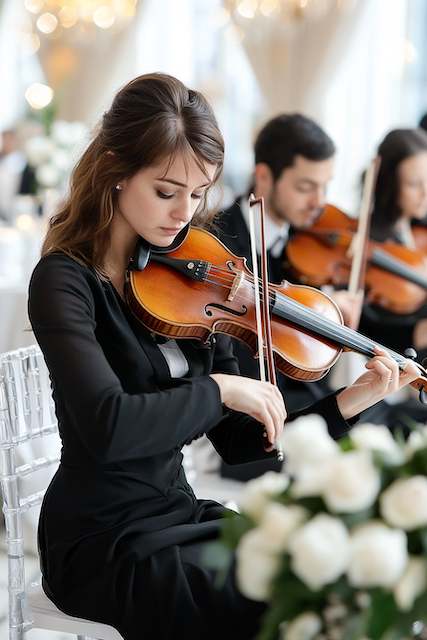
Music creates the emotional tone of your ceremony, so make sure every note flows seamlessly!
🎻 Where will the musicians or DJ be placed?
🎻 How many chairs do they need?
🎻 Is there a nearby power source if needed?
🎻 Can they clearly see the processional to stay in sync?
🎻 Is the lighting adequate for them to read their sheet music?
🎻 Will they use the venue’s piano? (If yes, check if it needs tuning!)
For sound:
🎤 Do you need wireless or lapel microphones for the officiant, bride and groom, readers, and vocalists?
🎤 Do you have music stands ready for live performers or speakers?
Plan the Setup at the Ceremony Site
Design a space that’s not just beautiful, but functional. Consider:
🌿 A small table for ceremonial items
- Unity candle
- Kiddush cup or glass to break (Jewish weddings)
🌿 An easel for the ketubah display
🌿 Stage risers - How many people will stand on them?
- Do they need fabric draping (ask your florist)?
🌿 Decor setup - Ceremony arch or chuppah
- Floral arrangements on pedestals
🌿 Lighting - Spotlight for the couple
- Uplighting to enhance floral décor
🌿 Memorial table - Are you honoring loved ones who’ve passed? Where will it be placed?
Seating details:
🪑 Who will be seated in the front row?
🪑 Will you need reserved signs or name cards for VIP seating in the first rows?
Organize Ceremony Programs
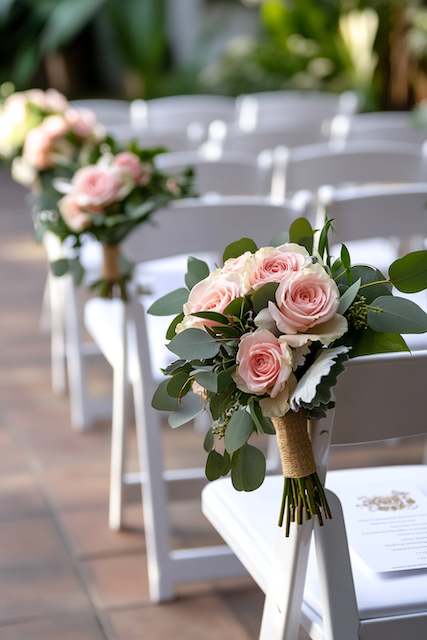
Programs are a thoughtful touch and a keepsake for your guests! Decide:
📖 Will ushers hand them out, or will they be placed on each chair or pew?
📖 Who’s in charge of distributing them before guests arrive?
Quick Checklist to Keep You on Track
✔️ Confirm ceremony layout and seating
✔️ Schedule your rehearsal
✔️ Coordinate processional order and music timing
✔️ Confirm who cues musicians and readers
✔️ Organize ceremonial items and who’s responsible for setup
✔️ Finalize microphone and sound needs
✔️ Prep lighting and stage setup
✔️ Confirm front row seating and reserved signs
✔️ Plan program distribution
Your ceremony should feel effortless, but thoughtful planning makes all the difference behind the scenes. A well-orchestrated flow ensures that your wedding day starts with heart, beauty, and seamless moments everyone will remember.
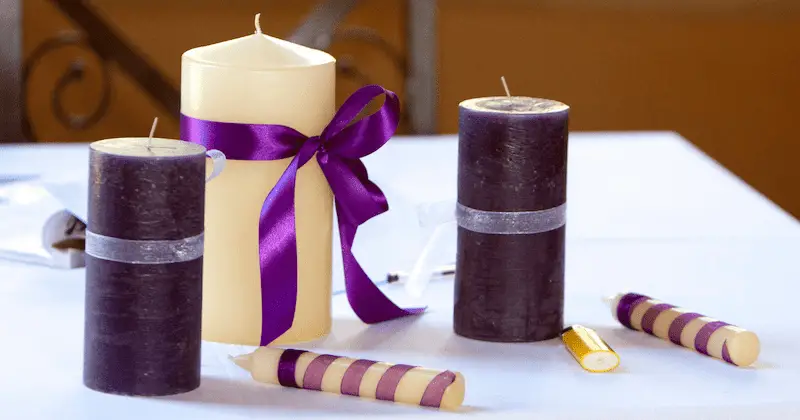
4. Write Meaningful, Heartfelt Wedding Vows
Among all the details of your wedding day, your vows are yours—personal, powerful promises that come straight from the heart. While your planner may handle the logistics, this is something only you can create.
Start Early (You’ll Be Glad You Did!)
Give yourself plenty of time to write and reflect. Starting early means:
🖊️ No last-minute stress
🖊️ Time to revise and fine-tune
🖊️ The chance to let the words really feel like you
Aim to finish your vows at least a few weeks before the big day. You’ll want time to practice reading them out loud—and maybe tuck a tissue in your pocket!
Keep It Simple, Keep It Real
Your vows don’t have to be long or poetic (unless that’s your style!). Some of the most moving promises are short and simple:
❤️ “I promise to stand by your side, no matter what.”
❤️ “You are my best friend, my biggest supporter, and my greatest adventure.”
The key? Speak from your heart.
How to Get Started
Feeling stuck? Try these brainstorming tips:
✔️ Make a list of what you love about your partner
✔️ Think about what makes your relationship special
✔️ Reflect on promises that feel meaningful to you
✔️ Recall special moments that capture who you are as a couple
From there, narrow it down to the points that matter most. Your vows don’t need to be a complete history of your love—they just need to capture the heart of your commitment.
Crafting Your Vows
Once you have your ideas, start shaping them into sentences:
🖋️ What do you admire most about your partner?
🖋️ What are you promising for the future?
🖋️ How does your partner make you feel?
🖋️ Why are you excited to spend your life together?
And remember, there’s no such thing as “perfect” vows. As long as they’re authentic, they’ll be unforgettable.
Take your time, breathe, and enjoy the process. This is your chance to tell your love story in your own words—whether it’s romantic, lighthearted, deeply spiritual, or a little bit of everything.
5. Choose Music That Sets the Tone for Your Ceremony
Your ceremony music does more than fill the air—it sets the entire mood for the moment you say “I do.” From your walk down the aisle to the joyful recessional, each song helps tell your love story.
The right music makes your ceremony feel personal, meaningful, and unforgettable.
Start with the Vibe You Want
Before you pick specific songs, think about the atmosphere you’re trying to create:
🎶 Traditional and timeless?
🎶 Modern and romantic?
🎶 Fun, lighthearted, and unexpected?
🎶 Reflective and emotional?
Once you have a clear vision, it’s easier to select music that matches your style—and fits the flow of your wedding day.
Match the Music to Your Setting
Consider your venue and ceremony style when selecting your songs:
🏛️ A house of worship may have rules about what’s allowed—be sure to check!
🏞️ An outdoor garden ceremony might pair beautifully with soft acoustic music or a string quartet.
🎤 A modern loft or ballroom could be perfect for a solo vocalist or recorded tracks with a DJ.
Make sure your music is appropriate for both the setting and the length of your ceremony. A longer ceremony might call for more background instrumentals, while a shorter one can highlight one or two powerful songs.
Where to Include Music
Here are the key moments where music plays a starring role:
- Pre-Ceremony – Sets the mood as guests arrive
- Processional – For the wedding party and your grand entrance
- During the Ceremony – Background music, special performances, or unity ceremonies
- Recessional – The joyful, upbeat song as you walk back up the aisle together
- Post-Ceremony – Keep the vibe going while guests exit or head to cocktail hour
Song Ideas for Every Style
Need inspiration? Here are some favorites based on different vibes:
💍 Classic Choices
- “Canon in D” by Pachelbel
- “Bridal Chorus” by Richard Wagner (“Here Comes the Bride”)
- “Ave Maria” by Schubert
💍 Modern and Romantic
- “A Thousand Years” by Christina Perri
- “All You Need Is Love” by The Beatles
- “Marry Me” by Train
💍 Unique and Personal
- An acoustic version of your favorite love song
- A meaningful song from your first date or a favorite movie soundtrack
- A family member or friend performing a special piece
Ask the Experts
Still feeling stuck? Don’t worry! Your wedding planner or ceremony musician can offer suggestions tailored to your style and venue. They’ve seen what works—and they know how to make it sound incredible.
6. Find the Right Officiant to Lead Your Ceremony
Your officiant isn’t just someone who stands at the front and says a few words—they’re the heart and voice of your ceremony. They’ll set the tone, guide you through your vows, and officially pronounce you married! So, choosing the right person is a big decision.
Whether you’re dreaming of a heartfelt, spiritual exchange or a lighthearted, modern ceremony, the right officiant can make it unforgettable.
Decide on the Type of Ceremony You Want
Start by thinking about the overall tone and style of your ceremony.
- Religious – Do you want a ceremony grounded in your faith or cultural traditions?
- Non-religious or spiritual – Prefer something more personal or secular, with custom vows and meaningful readings?
Knowing your ceremony style will help narrow down your options.
Options for Choosing an Officiant
Here are a few routes couples take—find the one that fits you best!
1. Religious Clergy or Spiritual Leader
If you belong to a specific faith, reach out to your clergyman or woman—like a priest, minister, rabbi, imam, or other spiritual leader.
✔️ They’re experienced in leading ceremonies with religious significance
✔️ They’ll guide you through any traditions or requirements
✔️ This option honors your faith and family customs
2. Friend or Family Member as Officiant
Want someone close to you to officiate?
✔️ This adds a personal, heartfelt touch
✔️ Perfect for secular or custom ceremonies
✔️ Just be sure they’re comfortable speaking in front of a crowd and are confident in leading the ceremony
💡 Pro Tip: They’ll likely need to get ordained (online ordinations are often quick and easy!)—and they should familiarize themselves with your ceremony script in advance.
3. Professional Officiant
Hiring a pro is a great option if you want:
✔️ An experienced leader who’s presided over many weddings
✔️ Someone who can offer guidance on writing vows and structuring the ceremony
✔️ A smooth, seamless experience where you don’t have to worry about logistics
💡 Wedding planners often have a list of trusted officiants they can recommend.
What to Look for in an Officiant
No matter who you choose, make sure they:
🎤 Are comfortable speaking in front of a large group
🕒 Can keep the ceremony flowing and on schedule
💬 Have a tone and style that matches your vision—whether that’s serious, lighthearted, spiritual, or formal
🤍 Will take the time to get to know you as a couple to personalize the ceremony
Most importantly? Choose someone you trust to make your wedding ceremony feel extra special.
Quick Tips Recap
✔️ Decide if you want a religious or non-religious ceremony
✔️ Narrow down your officiant options based on your ceremony style
✔️ Make sure your officiant is confident speaking to a crowd
✔️ Ask them to walk you through the ceremony flow in advance
✔️ Ensure they know any legal requirements (like signing the marriage license!)
Your officiant will be front and center for one of the most important moments of your life. Choose someone who makes you feel at ease, understands your love story, and will guide you through the ceremony with warmth and heart.
7. Decorate Your Ceremony Space to Match Your Wedding Vision
Your ceremony space is where you’ll exchange vows, share your “I do’s,” and create one of the most meaningful moments of your life. So why not make it just as stunning and intentional as the rest of your wedding day?
Whether you’re going for timeless elegance or a modern, minimal look, thoughtful decor helps bring your vision to life. And no, decorating your ceremony space isn’t just an extra expense—it’s an opportunity to set the tone for the entire celebration.
Start with the Ceremony Location
Let your venue guide your decor choices. Think about the space itself—its features, architecture, and natural beauty—and build from there.
Here are some ideas to get you started:
🏛️ Church or Chapel
- Focus on the altar or chancel area—this is where all eyes will be.
- Add statement floral arrangements or greenery to frame the space beautifully.
- Consider simple aisle markers to keep it elegant and respectful.
🌿 Outdoor Ceremony
- Highlight the natural surroundings with subtle decor that enhances the beauty, like wooden arches, floral garlands, or greenery-filled urns.
- Use soft linens, flowing drapes, or simple floral installations to create an organic, romantic feel.
🏰 Ballroom or Indoor Venue
- Bring the glamour with dramatic uplighting, statement flower arrangements on pedestals, and luxurious draping.
- A floral arch or chuppah can make a stunning focal point at the altar.
Key Considerations When Decorating Your Ceremony Space
As you plan your decor, keep these practical details in mind:
- Guest flow – Where are guests entering and exiting? Make sure decor enhances, rather than blocks, these pathways.
- Focus point – Where will guests be looking while seated? Keep the altar or ceremony focal area beautifully decorated.
- Photo opportunities – Consider how the space will photograph from every angle.
- Weather and elements (for outdoor ceremonies) – Will flowers hold up? Will decor stay in place if it’s windy?
Aisle Decor Details (Because Everyone Will Be Watching!)
Your aisle is the path to one of the biggest moments of your life—so make it count! Whether you keep it simple or go all-out, make sure the aisle decor fits the space and is safe for guests.
Here’s your aisle decor checklist:
✔️ Aisle Length and Width
- Know the dimensions to avoid overcrowding.
✔️ Decor Options - Lanterns, floral arrangements, candles in glass cylinders, or topiaries flanking the aisle
✔️ Aisle Runner - Will you have one? If so, how long does it need to be?
✔️ Flower Petals - Are you lining the aisle or having a flower girl scatter petals?
✔️ Safety First - Are candleholders sturdy enough to avoid tipping if bumped?
- If using open flames, consider guests with long dresses and keep flames well-protected.
Aisle Runner Etiquette & Logistics
Planning to use an aisle runner? Here are a few things to consider:
🎀 When will it be placed?
- Pre-set before guests arrive
- Rolled out just before the bride’s entrance (a classic, dramatic touch!)
🎀 Who’s in charge of it? - Assign someone the role of pulling it down smoothly and on cue.
🎀 Guest Access - If pre-set, do you have side aisles for guests to reach their seats without walking on it?
- Consider roping off the aisle with ribbon until it’s time for the processional.
Quick Tips Recap
✔️ Let your venue and wedding style guide your decor choices
✔️ Focus on key areas: the altar, the aisle, and entrance/exit points
✔️ Consider guest flow and safety
✔️ Make sure decor complements the ceremony space, not overwhelms it
✔️ Plan aisle decor and runner logistics ahead of time
Your ceremony space is where your forever begins—why not make it magical? Whether you choose understated elegance or breathtaking drama, thoughtful decor will help create a beautiful, memorable setting for your vows.
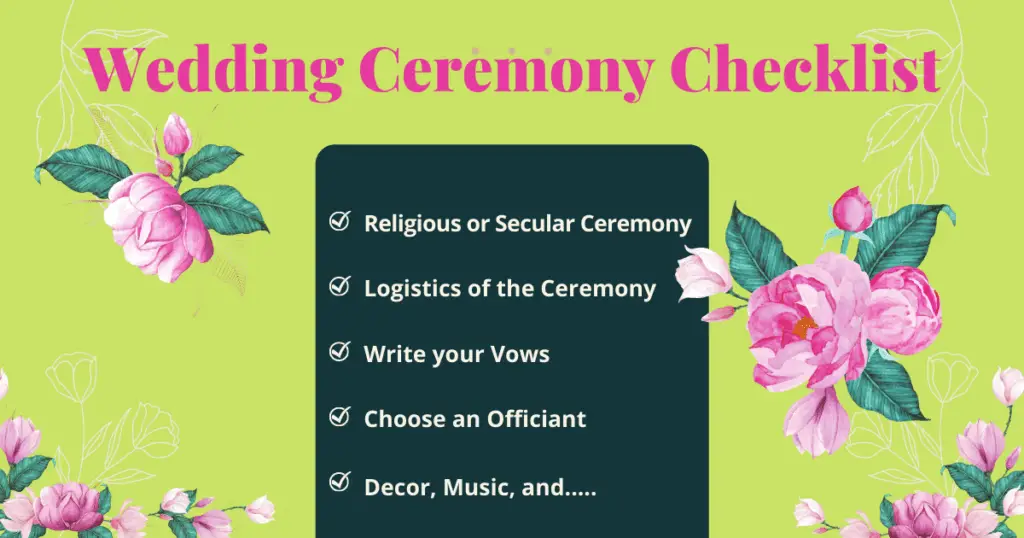
8. Don’t Forget These Extra Ceremony Essentials
You’ve planned the big things—your vows, your music, the decor—but it’s the small details that help make your ceremony feel personal, welcoming, and complete. These thoughtful touches ensure everything runs smoothly and leave your guests feeling cared for from the moment they arrive.
Here’s a handy list of ceremony must-haves to double-check before the big day!
Personal Flowers
💐 Bridal Bouquet – The star of your floral lineup
💐 Bridesmaids’ Bouquets – Complement the bride’s flowers and add color to the processional
🌿 Boutonnières & Corsages – For the groom, groomsmen, parents, and special family members
Flower Girl & Ring Bearer Essentials
🌸 Flower Petal Baskets – Ready to be sprinkled down the aisle
💍 Ring Pillow (or Special Box) – Pro tip: Use faux rings for the walk down the aisle and keep the real ones safe with your best man or maid of honor!
Thoughtful Extras for Guests
📖 Guest Book & Nice Pen – Give guests a spot to leave well wishes and advice
🎁 Gift Card Box – A safe, designated place for cards and envelopes
🖼️ Photo Frames with Couple Photos – A sweet touch to personalize your ceremony space
Ceremony-Specific Traditions
🕍 Yarmulkes & Bobby Pins (Jewish Ceremonies) – Make sure you have plenty for guests who want them
🎉 Confetti, Rice, or Bubbles – Check with your venue first! Some locations have restrictions. If allowed, bubbles are a mess-free, joyful alternative that make for stunning photos.
Pre-Ceremony Comforts for Guests
🥂 Welcome Drinks – Greet guests with pre-ceremony refreshments
- Self-serve or passed beverages (think waters, sodas, lemonade, or juices)
- Perfect for outdoor or summer weddings to keep everyone comfortable
Signage That Welcomes & Guides
📜 Welcome Sign – Let guests know they’re in the right place with a stylish welcome
🪧 Directional Signs (if needed) – Point guests to seating, restrooms, or other key spots
And Most Important of All…
📄 Marriage License! – It’s easy to forget in the excitement, but you can’t make it official without it!
💡 Pro Tip: Assign someone you trust (planner, best man, maid of honor) to be in charge of bringing it to the ceremony and handing it off to your officiant.
Quick Tips Recap
✔️ Personal flowers and accessories ready to go
✔️ Ceremony props for your wedding party (ring pillow, flower baskets)
✔️ Guest book and card box in place
✔️ Traditional items (yarmulkes, confetti, etc.) on hand
✔️ Refreshments and signage to welcome guests
✔️ Your marriage license is packed and ready!
These small details add warmth, personality, and polish to your ceremony. They help your guests feel comfortable and appreciated—and they ensure everything is in place for your big moment. Check these items off your list, and you’ll be ready to walk down the aisle with total peace of mind!

